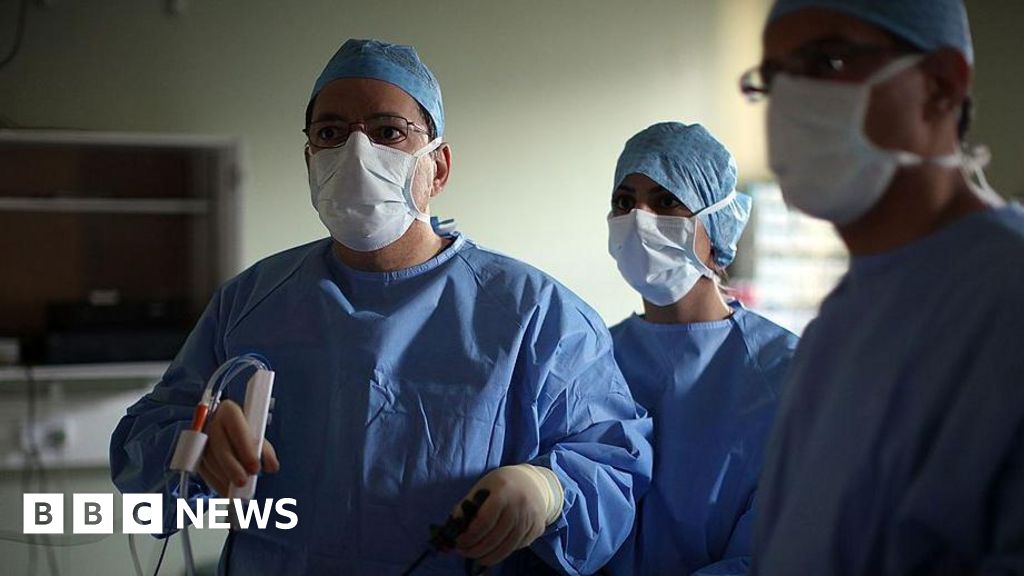Hundreds of bodies responsible for overseeing and running parts of the NHS in England will be scrapped, the government has said. The organisations to be abolished include Healthwatch England, which advocates on behalf of patients, and the National Guardian's Office, which supports whistleblowers. Health Secretary Wes Streeting said the current system was too complex and the NHS needed "more doers and fewer checkers". The changes are being made as part of Labour's 10-year health strategy set to be published next week. In total 201 organisations will be scrapped, including bodies set up by the last Conservative government to develop health plans for their local areas. The organisations to be abolished include: The decision comes afterPrime Minister Sir Keir Starmer announced in Marchthat NHS England, the administrative body responsible for the day-to-day management of the health service, would be axed and the system brought under closer government control. Ministers said there were more than 150 bodies responsible for regulating or assessing healthcare services in England, and they risked overwhelming staff with "uncoordinated" guidance. "Over the past decade and a half, an overly complex system of healthcare regulation and oversight has been left to spiral out of control," said Mr Streeting. "So many of the problems in the NHS come down to a failure to listen to patients. The changes we are making will hold a megaphone up to patients' lips, and force the service to listen to their feedback." In the future, patients will be encouraged to make greater use of the NHS smartphone app to leave personal feedback on the care they receive. Matthew Taylor, the chief executive of the NHS Confederation, which represents providers of health services, said any opportunity to reduce duplication and invest money into frontline care should be welcomed. "However, NHS leaders would encourage the government to not forget the failings that led to these bodies being set up in the first place and tread carefully so as to ensure their vital missions continue in future," he added. "Staff and patients will still need safe spaces where they can speak up." Under the new strategy, the NHS will also trial a scheme linking the money a hospital receives directly to the quality of care it provides. Patients will be asked to review their treatment and, if a low rating is given, a proportion of that funding could be diverted to a regionally-held NHS improvement fund rather than paid to the hospital itself. The government said the scheme would only be introduced where there had been a track record of very poor service and evidence that patients were not being listened to. The NHS Confederation warned it would have to be carefully designed to stop hospitals being penalised for issues beyond their immediate control such as difficulties recruiting staff and the poor state of some hospital buildings. Days before the release of the government's 10-year health plan, the new head of NHS England has said too many "fossilised" ways of working have been retained by the health service. In his first interview since his appointment as chief executive of NHSE, Sir Jim Mackeytold the Daily Telegraphthe NHS had built "mechanisms to keep the public away". "We've made it really hard, and we've probably all been on the end of it. "You've got a relative in hospital, so you're ringing a number on a ward that no-one ever answers. "The ward clerk only works nine to five or they're busy doing other stuff; the GP practice scramble every morning. "It feels like we've built mechanisms to keep the public away because it's an inconvenience," he added.
Hundreds of NHS quangos to be scrapped
TruthLens AI Suggested Headline:
"UK Government to Abolish Hundreds of NHS Oversight Bodies"
TruthLens AI Summary
The UK government has announced the scrapping of hundreds of organizations responsible for overseeing various aspects of the National Health Service (NHS) in England. Among the 201 bodies set to be abolished are Healthwatch England, which advocates for patient rights, and the National Guardian's Office, dedicated to supporting whistleblowers in the healthcare sector. Health Secretary Wes Streeting emphasized that the current oversight system is overly complicated and expressed a need for a shift towards more action-oriented roles within the NHS. This move is part of Labour's forthcoming 10-year health strategy, which aims to streamline operations and enhance patient engagement. The decision aligns with Prime Minister Sir Keir Starmer's earlier announcement regarding the dissolution of NHS England, the body managing day-to-day operations of the health service, in favor of tighter government control. Streeting pointed to a proliferation of over 150 regulatory bodies that contribute to a convoluted system, ultimately hindering effective patient care and feedback mechanisms.
To encourage patient involvement, the government plans to promote the use of an NHS smartphone app that will allow individuals to provide feedback on their care experiences. Matthew Taylor, chief executive of the NHS Confederation, welcomed the initiative to reduce redundancy and reallocate funds towards frontline services but cautioned against neglecting the vital roles these organizations play in ensuring patient safety and advocacy. Additionally, a new funding scheme is being introduced that ties hospital funding to the quality of care delivered, with the potential for funds to be redirected to improvement initiatives in cases of consistently low patient ratings. This initiative aims to address service shortcomings while ensuring that hospitals are not unfairly penalized for external challenges. The incoming head of NHS England, Sir Jim Mackey, also highlighted the need for the NHS to evolve from outdated operational practices that create barriers between patients and care providers, advocating for a system that fosters greater accessibility and responsiveness to patient needs.
TruthLens AI Analysis
You need to be a member to generate the AI analysis for this article.
Log In to Generate AnalysisNot a member yet? Register for free.
